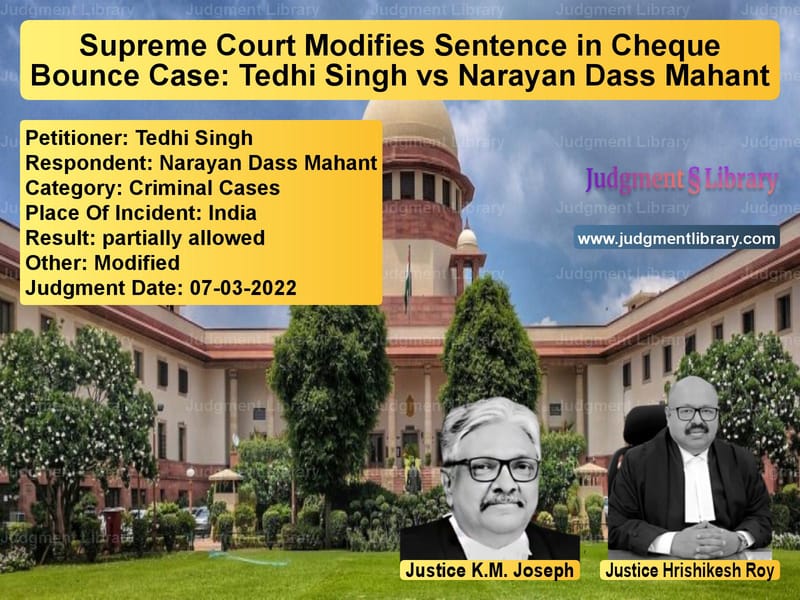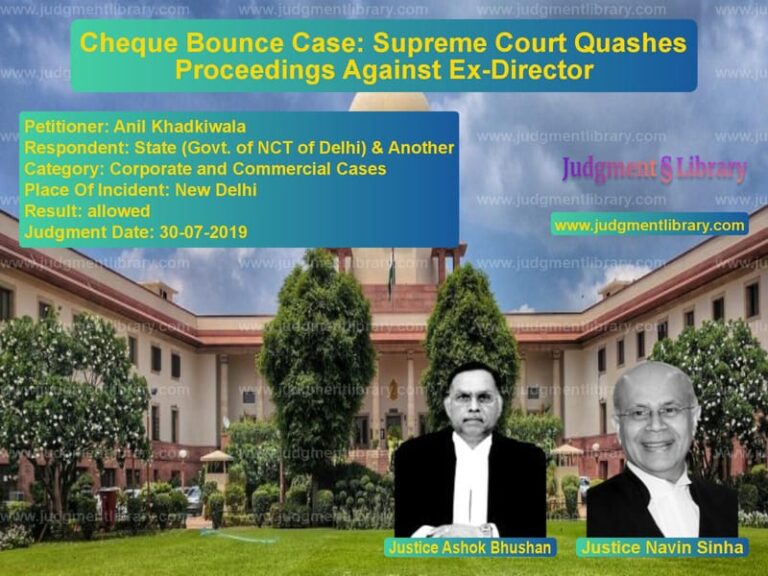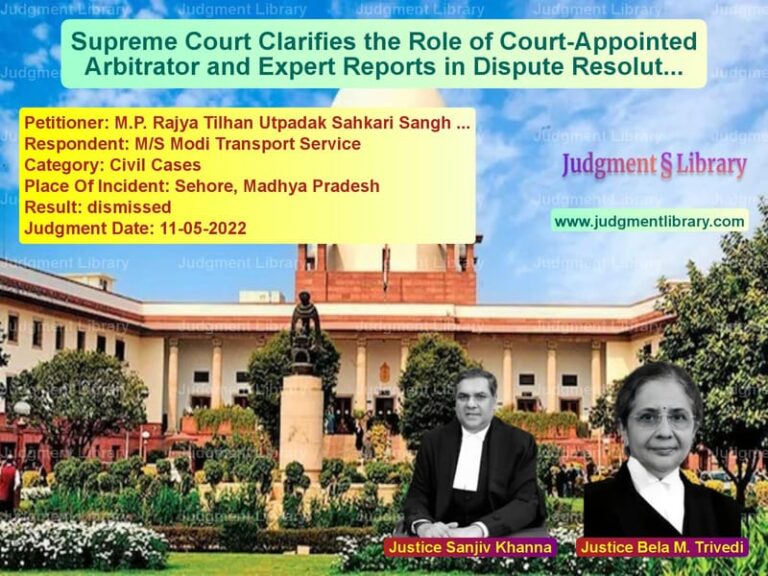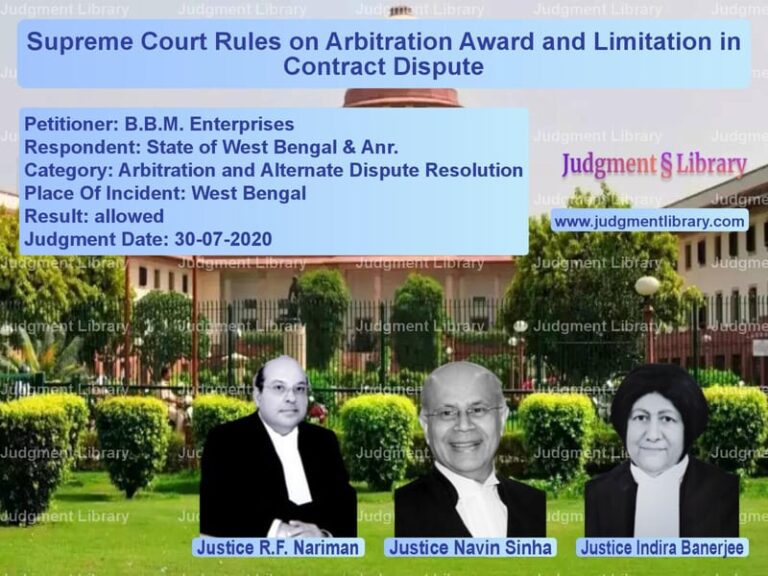Supreme Court Modifies Sentence in Cheque Bounce Case: Tedhi Singh vs Narayan Dass Mahant
The Supreme Court of India, in its judgment dated March 7, 2022, ruled on the case of Tedhi Singh vs Narayan Dass Mahant, addressing the legal implications of a cheque bounce under Section 138 of the Negotiable Instruments Act, 1881. The Court upheld the conviction of the appellant but modified the sentence, replacing the one-year imprisonment with a fine and additional compensation to the respondent.
Background of the Case
The dispute arose when the respondent, Narayan Dass Mahant, filed a complaint under Section 138 of the Negotiable Instruments Act (NI Act), alleging that the appellant, Tedhi Singh, had issued a cheque for Rs. 7 lakh, which was dishonored due to insufficient funds. The trial court found the appellant guilty and sentenced him to one year of simple imprisonment along with a compensation order for Rs. 7 lakh.
The appellant challenged the conviction before the Sessions Court, which upheld the trial court’s decision. A subsequent revision petition was filed before the High Court, which also dismissed the appeal. Finally, the appellant approached the Supreme Court, seeking relief.
Read also: https://judgmentlibrary.com/criminal-limitation-period-supreme-court-clarifies-computation-of-time/
Petitioner’s Arguments (Tedhi Singh)
The appellant, Tedhi Singh, contended:
- The respondent had no financial capacity to lend Rs. 7 lakh.
- The cheque was misused and was not issued for any legitimate liability.
- The trial court, Sessions Court, and High Court had failed to appreciate the evidence properly.
- The High Court erred in rejecting the testimony of defense witnesses (DW1-DW4), who were bank officers, proving that the respondent did not have the financial capacity to lend Rs. 7 lakh.
- There was no evidence that the appellant received any money from the respondent.
Respondent’s Arguments (Narayan Dass Mahant)
The respondent, Narayan Dass Mahant, countered:
- The appellant had admitted to signing the cheque.
- The appellant had failed to inform the bank or police about any alleged loss of a signed cheque.
- The burden of proof was on the accused to rebut the presumption under Section 139 of the NI Act.
- The appellant had issued a signed cheque, and the law presumes that it was issued for the discharge of a debt or liability.
Supreme Court’s Observations
The Supreme Court, comprising Justices K.M. Joseph and Hrishikesh Roy, analyzed the evidence and ruled:
On the Presumption Under Section 139 of the NI Act
The Court reaffirmed that:
“Once the execution of a cheque is admitted, Section 139 of the Act mandates a presumption that the cheque was for the discharge of any debt or other liability.”
The Court further stated:
“The presumption under Section 139 is a rebuttable presumption, and the onus is on the accused to raise a probable defense.”
On the Financial Capacity of the Complainant
The Court acknowledged that the appellant attempted to rebut the presumption by arguing that the complainant did not have the financial capacity to lend Rs. 7 lakh. However, the Court noted:
“At the time of trial, unless the accused had set up the case in the reply to the statutory notice, it was not required of the complainant to initially lead evidence of financial capacity.”
On the Alleged Misuse of the Cheque
The appellant argued that the cheque was lost and misused by the complainant. However, the Court found that:
“The appellant failed to inform the bank or the police about the alleged loss of the cheque book containing the signed cheque.”
Final Ruling
The Supreme Court upheld the conviction but modified the sentence:
- The one-year imprisonment was set aside.
- The appellant was instead directed to pay a fine of Rs. 5,000.
- The appellant was ordered to pay an additional Rs. 15,000 as compensation to the complainant.
- If the appellant failed to pay the fine within one month, he would face one month of simple imprisonment.
Implications of the Judgment
This ruling reinforces several key principles:
- The presumption of validity under Section 139 of the NI Act is strong but rebuttable.
- The accused must provide concrete evidence to rebut the presumption.
- Failure to report a lost cheque to the bank or police weakens an accused’s defense.
- The Supreme Court may exercise discretion in modifying sentences while upholding convictions.
Conclusion
The Supreme Court’s decision in Tedhi Singh vs Narayan Dass Mahant affirms the strong presumption in favor of complainants in cheque bounce cases while recognizing the right of the accused to rebut the claim. However, it also sets a precedent for modifying sentences where the accused does not establish a complete defense but where imprisonment may not be warranted. This judgment provides clarity on how courts should assess financial capacity arguments and what constitutes an adequate rebuttal under the NI Act.
Petitioner Name: Tedhi Singh.Respondent Name: Narayan Dass Mahant.Judgment By: Justice K.M. Joseph, Justice Hrishikesh Roy.Place Of Incident: India.Judgment Date: 07-03-2022.
Don’t miss out on the full details! Download the complete judgment in PDF format below and gain valuable insights instantly!
Download Judgment: tedhi-singh-vs-narayan-dass-mahant-supreme-court-of-india-judgment-dated-07-03-2022.pdf
Directly Download Judgment: Directly download this Judgment
See all petitions in Cheque Dishonour Cases
See all petitions in Fraud and Forgery
See all petitions in Judgment by K.M. Joseph
See all petitions in Judgment by Hrishikesh Roy
See all petitions in partially allowed
See all petitions in Modified
See all petitions in supreme court of India judgments March 2022
See all petitions in 2022 judgments
See all posts in Criminal Cases Category
See all allowed petitions in Criminal Cases Category
See all Dismissed petitions in Criminal Cases Category
See all partially allowed petitions in Criminal Cases Category







